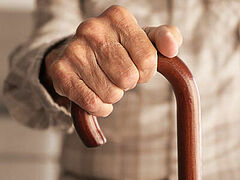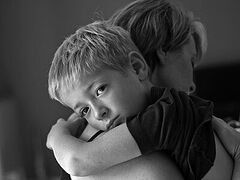The Lord guides, instructs and teaches us all the time. Sometimes it is obvious, so the meaning of a situation is clear immediately, and sometimes it is hidden. These stories are about God's lessons taught in the humdrum of everyday life.
If it were not for aunt...
Priest Dionisy Kamenshchikov, rector of St. Elias Church on Ilyinsky Square in Saratov, Head of the Missionary Department of the Saratov Diocese:
The wife of one of my acquaintances, a priest, was born thanks to… her aunt.
It was a pleasant summer evening on the veranda of their holiday cottage. The future aunt of a priest’s wife was running around the yard. At that time, her parents were talking about whether to have a second child... Some Russian readers are probably aware of the tradition that existed in families in the Soviet era: to ask children the question whether they wanted a sibling.
 Priest Dionisy Kamenshchikov The little aunt of a priest's wife was asked the same question:
Priest Dionisy Kamenshchikov The little aunt of a priest's wife was asked the same question:
"Daughter, do you want a brother or sister?"
“I do!” the girl answered without hesitation.
One moment, one answer by a small child determined the fate of a new life! So the mother of a future priest’s wife was born, and then the priest’s wife herself.
This story has become a family tradition. Today the priest and his wife exclaim: What if the grandparents had resorted to an abortion? How many destinies would have been lost! There simply wouldn’t have been these very lives had they decided to have an abortion. It is difficult to imagine what would have happened if a particular person hadn’t been born. The atrocity of abortion doesn’t deprive only one person of a future, but whole generations.
How to stumble over... God
 Priest Anthony Michurin Priest Anthony Michurin, a priest of the Church of the Holy Martyrs Alexander and Antonina of Rome in Selishche, in the Kostroma Diocese, and Deputy Head of the Missionary Department:
Priest Anthony Michurin Priest Anthony Michurin, a priest of the Church of the Holy Martyrs Alexander and Antonina of Rome in Selishche, in the Kostroma Diocese, and Deputy Head of the Missionary Department:
Over the years, especially since the day of my ordination, I have heard all kinds of people tell all sorts of stories about their encounters with the Creator. Some of them sounded prosaic, while others could pass as scripts for a Hollywood drama.
One autumn evening, I, a young priest of the Russian Orthodox Church, was returning home from somewhere. Approaching the entrance of the block of apartments where I lived, I saw a very familiar sight: a neighbor of mine, drunk and dozing off as usual on a run-down bench.
Yet instead of passing him by, diving into the entrance and forgetting that painful sight, for some reason unknown to me even now, I walked up to him, shook his shoulder, and, looking into his lackluster eyes, stretched out my hand and said, “Hello.”
The handshake, as you understand, was very brief; and I, representing the Russian Church, hurried home to a meal of potatoes with pickles.
He caught up with me on the stairs. There was none of the blather typical of drunks. He gave me his hand and said only one thing, “Thank you,” and quickly walked away.
I don’t mean to contradict the “Orthodox teetotalers” or justify drunken people, but since I saw the awakened image of God in that degraded man, I dare to hope that I understood much of what the Savior spoke about to His disciples and to me, someone trying to become one of them. And may God help me learn this lesson, without which all theology is reduced to abstract words. Not to think of yourself as someone special while hitting your head against a brick wall in your conceit and pride. That is what I wish for you as well.
My first Bible
Hieromonk Anthony (Skorik), head of the Pilgrimage Service of the Donskoy Stavropegic Monastery in Moscow:
 Hieromonk Anthony (Skorik) I didn’t like to read as a child—I considered it boring, if not outright torture. Yet I still felt love and reverence before two books: the collected fairy tales of the Brothers Grimm, and a children’s Bible.
Hieromonk Anthony (Skorik) I didn’t like to read as a child—I considered it boring, if not outright torture. Yet I still felt love and reverence before two books: the collected fairy tales of the Brothers Grimm, and a children’s Bible.
In the summer, I often stayed overnight at my godmother’s summer house. I would “dive” into that children’s Bible every evening and I could leaf through it for hours. I didn’t even read the text, but carefully examined the mysterious illustrations of biblical subjects, which attracted me with something that was mysterious, bright and interesting at the same time. There were two pictures that I will remember forever.
The first was a scene of the Flood with Noah's Ark rocked by fierce waves. But I was most amazed and captivated by another illustration: the Savior’s Sermon on the Mount. I don't know what exactly I found in it. A quiet, calm and peaceful picture—but it grabbed me so forcefully that I looked through the book over and over again.
Time went by. I started to go to church. Once on the feast of the Transfiguration, I was blessed to enter the altar. That event prompted me to read my first book in life—the Orthodox Catechism. But I was already beginning to dream of reading a real Bible.
As my thirteenth birthday was approaching, my parents began to wonder what present I wanted from them. The answer didn’t take long—I asked them to buy me a copy of the real Bible. It was a shock! My mother wasn’t very pleased with my “pious” hobbies as it was! But in the end she agreed.
At our church, the cheapest Bible cost eighty hryvnia [Ukrainian currency.—Trans.], but I didn’t like it. It was in an inconvenient format, the paper was too thin, and had a bold font that was unpleasant to the eyes. There was another one on sale, but it was much more expensive.
In the city of Kharkov (Ukraine) where I grew up, there was a central market, and next to it, across the river, were book stalls. I went there in search of a Bible. And I found it! There were several Bibles for sale on a cardboard box, among the makeshift shelves. So I bought myself a copy.
My approach to reading the Bible was serious: I began to read it from the very beginning, from Genesis. The speed of reading was extraordinary for me: I read the whole Book of Genesis in one day, finished Exodus by the middle of the second day, and by the end of the summer vacation I finished the text of the Apocalypse of St. John the Evangelist with a feeling of joy and accomplishment.
The Bible was one of the first books that I read in its entirety. It radically changed my worldview—so much so that I became an Orthodox priest. Now I don't read the Holy Scriptures every day, and I really regret it when I can't take the Bible into my hands. The main thing that I understood for my entire life is that if prayer is a conversation between man and God, then reading the Holy Scriptures is a conversation between God and man.
St. Basil, “the Sniffler” and a proud deacon
Priest Alexei Spitsyn, rector of St. Panteleimon’s Church in the village of Roza in the Diocese of Chelyabinsk:
 Priest Alexei Spitsyn St. Basil the Great is highly venerated in our family. Once, when I was a seminarian, I was staring at a fresco of St. Basil the Great during a service and wondering, What did this saint do that the Church honored him with the title “Great”?
Priest Alexei Spitsyn St. Basil the Great is highly venerated in our family. Once, when I was a seminarian, I was staring at a fresco of St. Basil the Great during a service and wondering, What did this saint do that the Church honored him with the title “Great”?
After the service, I went to the cathedral shop and started vigorously searching for books with titles mentioning St. Basil’s name. I came across a thick book with his Life and works, which was published by the Moscow Sretensky Monastery. I skimmed through pages related to the saint's biography, and an amazing feeling came over me. My mind and heart were so touched by St. Basil the Great’s words that I wanted to drop everything and run away to pray. My birthday was nearing, and there was only one answer to questions about what to get me: the works of St. Basil the Great.
I received the book for my birthday as promised. After class, I painstakingly wrote into a notebook the teachings that most touched my soul. Over time, I began to add a short prayer to the saint who had become dear to me into my morning prayer rule. And I didn’t miss the chance to add to my knowledge about this Universal Teacher and his writings.
After I had graduated from seminary, the question of my ordination to the deaconate was raised. For several months, our ruling hierarch looked at me closely, tested me and talked with my wife. One fine evening, the archpastor called me over as I was carrying out my obedience, told me to pray and prepare for Holy Communion. On Sunday, I was expected to be ordained deacon at the church of St. Basil the Great in the city of Chelyabinsk.
During a service six months later, on the Eve of Theophany, the metropolitan invited me to talk—just talk about life. I returned to the service suspecting nothing. I continued to go up to the solea and read out the litanies. And before the Small Entrance, the metropolitan suddenly said, “Let's go and read the oath of ordination.” So I was ordained into the priesthood. I noted an interesting detail in the service—that the Liturgy was compiled by St. Basil the Great.
A coincidence? I don’t think so. I decided to name my oldest son Basil.
A proud deacon
At our cathedral, we had a deacon with a booming voice of which he was very proud. The deacon believed that his manner of reading the Gospel sounded like the reposed Archdeacon Andrei Mazur from Moscow. As for his “colleague,” the second deacon of the cathedral... well, he didn’t consider him to be a very talented person.
The incident happened during the All-Night Vigil service. The moment came when the deacon with the booming voice went to chant a litany. Standing in front of the Royal Doors, he suddenly smelled a vile smell. Bewildered, the deacon began to look around, casting a glance first at one end of the solea, then at the other. Once our deacon began reading out a petition, an unimaginable stench suddenly hit his nose even harder. After waiting for the choir to respond, the deacon breathed into his palm—it didn’t smell, neither did his sticharion and orarion. As the service progressed, a pattern emerged: the strange smell came whenever the deacon proclaimed a litany or exclamation. This led the deacon to believe that God wasn’t accepting his prayers. After the service, he went to confession with a contrite heart. And it never happened again.
“The Sniffler”
I have been called to visit patients in a comatose state on more than one occasion. In some cases, people miraculously return to consciousness during the prayer service celebrated in their presence. There have been many cases in my lifetime when God gave children to a couple in which both spouses were infertile, after their joint prayers to God. And I once knew a man with cancer who, after receiving Communion, felt no more pain and spent the last week before his death in joyful calm.
I cannot help but mention an incident that occurs to one of my parishioners regularly. The fact is that she sniffles loudly every two or three seconds. Doctors shrugged their shoulders: no one knew how to treat a strange ailment.
It hadn't been like this all her life. She began suffering from this anomaly after disobeying a priest during Great Lent. This elderly woman asked for a blessing for something that should have waited until after Lent. Having heard what the priest had to say, the woman did what she wanted according to her own will, and mysteriously began to sniffle regularly!
Soon this elderly woman was nicknamed “the Sniffler” by local people. Over time, they got used to this phenomenon and stopped noticing it.
During Lent a year later, the time came for the first sacrament of Unction. I served alone—there weren’t many people, and there was no need to hurry. At the end of the service, when people were coming to kiss the cross, this elderly woman came up and said, bursting into tears, “Father! I’ve been healed!” Indeed, no one noticed how the sniffling during services had suddenly disappeared. It was a real miracle for our parish! But a week later, the inexplicable phenomenon resumed. The priests and parishioners made the following observation: the poor woman’s sniffling would disappear after each Unction for about a week, but not more.
God is always strong in performing miracles. He remembers us in every moment of our lives. I made a very important conclusion for myself: In order to learn some of life’s lessons, we also have to suffer. But our suffering is neither endless, nor pointless. This is how God reveals Himself to man in the most striking way.




